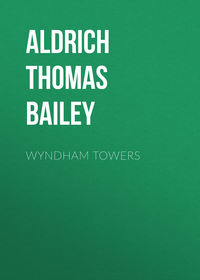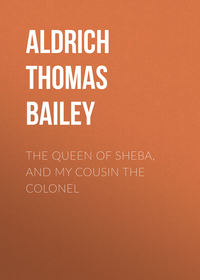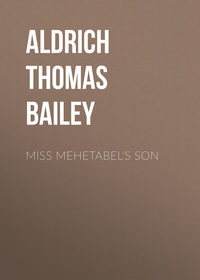 полная версия
полная версияA Rivermouth Romance
After Mrs. Bilkins, with a brow as severe as that of one of the Parcæ, had closed the door upon the O’Rourkes that summer morning, she sat down on the stairs, and, sinking the indignant goddess in the woman, burst into tears. She was still very wroth with Margaret Callaghan, as she persisted in calling her; very merciless and unforgiving, as the gentler sex are apt to be—to the gentler sex. Mr. Bilkins, however, after the first vexation, missed Margaret from the household; missed her singing, which was in itself as helpful as a second girl; missed her hand in the preparation of those hundred and one nameless comforts which are necessities to the old, and wished in his soul that he had her back again. Who could make a gruel, when he was ill, or cook a steak, when he was well, like Margaret? So, meeting her one morning at the fish-market—for Mr. O’Rourke had long since given over the onerous labor of catching dinners—he spoke to her kindly, and asked her how she liked the change in her life, and if Mr. O’Rourke was good to her.
“Troth, thin, sur,” said Margaret, with a short, dry laugh, “he ‘s the divil’s own!”
Margaret was thin and careworn, and her laugh had the mild gayety of champagne not properly corked. These things were apparent even to Mr. Bilkins, who was not a shrewd observer.
“I ‘m afraid, Margaret,” he remarked sorrowfully, “that you are not making both ends meet.”
“Begorra, I ‘d be glad if I could make one ind meet!” returned Margaret.
With a duplicity quite foreign to his nature, Mr. Bilkins gradually drew from her the true state of affairs. Mr. O’Rourke was a very bad case indeed; he did nothing towards her support; he was almost constantly drunk; the little money she had laid by was melting away, and would not last until winter. Mr. O’Rourke was perpetually coming home with a sprained ankle, or a bruised shoulder, or a broken head. He had broken most of the furniture in his festive hours, including the cooking-stove. “In short,” as Mr. Bilkins said in relating the matter afterwards to Mrs. Bilkins, “he had broken all those things which he should n’t have broken, and failed to break the one thing he ought to have broken long ago—his neck, namely.”
The revelation which startled Mr. Bilkins most was this: in spite of all, Margaret loved Larry with the whole of her warm Irish heart. Further than keeping the poor creature up waiting for him until ever so much o’clock at night, it did not appear that he treated her with personal cruelty. If he had beaten her, perhaps she would have worshipped him. It needed only that.
Revolving Margaret’s troubles in his thoughts as he walked homeward, Mr. Bilkins struck upon a plan by which he could help her. When this plan was laid before Mrs. Bilkins, she opposed it with a vehemence that convinced him she had made up her mind to adopt it.
“Never, never will I have that ungrateful woman under this roof!” cried Mrs. Bilkins; and accordingly the next day Mr. and Mrs. O’Rourke took up their abode in the Bilkins mansion—Margaret as cook, and Larry as gardener.
“I ‘m convanient if the owld gintleman is,” had been Mr. O’Rourke’s remark, when the proposition was submitted to him. Not that Mr. O’Rourke had the faintest idea of gardening. He did n’t know a tulip from a tomato. He was one of those sanguine people who never hesitate to undertake anything, and are never abashed by their herculean inability.
Mr. Bilkins did not look to Margaret’s husband for any great botanical knowledge; but he was rather surprised one day when Mr. O’Rourke pointed to the triangular bed of lilies-of-the-valley, then out of flower, and remarked, “Thim ‘s a nate lot o’ pur-taties ye ‘ve got there, sur.” Mr. Bilkins, we repeat, did not expect much from Mr. O’Rourke’s skill in gardening; his purpose was to reform the fellow if possible, and in any case to make Margaret’s lot easier.
Reestablished in her old home, Margaret broke into song again, and Mr. O’Rourke himself promised to do very well; morally, we mean, not agriculturally. His ignorance of the simplest laws of nature, if nature has any simple laws, and his dense stupidity on every other subject were heavy trials to Mr. Bilkins. Happily, Mr. Bilkins was not without a sense of humor, else he would have found Mr. O’Rourke insupportable. Just when the old gentleman’s patience was about exhausted, the gardener would commit some atrocity so perfectly comical that his master all but loved him for the moment.
“Larry,” said Mr. Bilkins, one breathless afternoon in the middle of September, “just see how the thermometer on the back porch stands.”
Mr. O’Rourke disappeared, and after a prolonged absence returned with the monstrous announcement that the thermometer stood at 820!
Mr. Bilkins looked at the man closely. He was unmistakably sober.
“Eight hundred and twenty what?” cried Mr. Bilkins, feeling very warm, as he naturally would in so high a temperature.
“Eight hundthred an’ twinty degrays, I suppose, sur.”
“Larry, you ‘re an idiot.”
This was obviously not to Mr. O’Rourke’s taste; for he went out and brought the thermometer, and, pointing triumphantly to the line of numerals running parallel with the glass tube, exclaimed, “Add ‘em up yerself, thin!”
Perhaps this would not have been amusing if Mr. Bilkins had not spent the greater part of the previous forenoon in initiating Mr. O’Rourke into the mysteries of the thermometer. Nothing could make amusing Mr. O’Rourke’s method of setting out crocus bulbs. Mr. Bilkins had received a lot of a very choice variety from Boston, and having a headache that morning, turned over to Mr. O’Rourke the duty of planting them. Though he had never seen a bulb in his life, Larry unblushingly asserted that he had set out thousands for Sir Lucius O’Grady of O’Grady Castle, “an illegant place intirely, wid tin miles o’ garden-walks,” added Mr. O’Rourke, crushing Mr. Bilkins, who boasted only of a few humble flower-beds.
The following day he stepped into the garden to see how Larry had done his work. There stood the parched bulbs, carefully arranged in circles and squares on top of the soil.
“Did n’t I tell you to set out these bulbs?” cried Mr. Bilkins, wrathfully.
“An’ did n’t I set ‘em out?” expostulated Mr. O’Rourke. “An’ ain’t they a settin’ there beautiful?”
“But you should have put them into the ground, stupid!”
“Is it bury ‘em, ye mane? Be jabbers! how could they iver git out agin? Give the little jokers a fair show, Misther Bilkins!”
For two weeks Mr. O’Rourke conducted himself with comparative propriety; that is to say, be rendered himself useless about the place, appeared regularly at his meals, and kept sober. Perhaps the hilarious strains of music which sometimes issued at midnight from the upper window of the north gable were not just what a quiet, unostentatious family would desire; but on the whole there was not much to complain of.
The third week witnessed a falling off. Though always promptly on hand at the serving out of rations, Mr. O’Rourke did not even make a pretence of working in the garden. He would disappear mysteriously immediately after breakfast, and reappear with supernatural abruptness at dinner. Nobody knew what he did with himself in the interval, until one day he was observed to fall out of an apple-tree near the stable. His retreat discovered, he took to the wharves and the alleys in the distant part of the town. It soon became evident that his ways were not the ways of temperance, and that all his paths led to The Wee Drop.
Of course Margaret tried to keep this from the family. Being a woman, she coined excuses for him in her heart. It was a dull life for the lad, any way, and it was worse than him that was leading Larry astray. Hours and hours after the old people had gone to bed, she would sit without a light in the lonely kitchen, listening for that shuffling step along the gravel walk. Night after night she never closed her eyes, and went about the house the next day with that smooth, impenetrable face behind which women hide their care.
One morning found Margaret sitting pale and anxious by the kitchen stove. O’Rourke had not come home at all. Noon came, and night, but not Larry. Whenever Mrs. Bilkins approached her that day, Margaret was humming “Kate Kearney” quite merrily. But when her work was done, she stole out at the back gate and went in search of him. She scoured the neighborhood like a madwoman. O’Rourke had not been at the ‘Finnigans’. He had not been at The Wee Drop since Monday, and this was Wednesday night. Her heart sunk within her when she failed to find him in the police-station. Some dreadful thing had happened to him. She came back to the house with one hand pressed wearily against her cheek. The dawn struggled through the kitchen windows, and fell upon Margaret crouched by the stove.
She could no longer wear her mask. When Mr. Bilkins came down she confessed that Larry had taken to drinking again, and had not been home for two nights.
“Mayhap he ‘s drownded hisself,” suggested Margaret, wringing her hands.
“Not he,” said Mr. Bilkins; “he does n’t like the taste of water well enough.”
“Troth, thin, he does n’t,” reflected Margaret, and the reflection comforted her.
“At any rate, I ‘ll go and look him up after breakfast,” said Mr. Bilkins. And after breakfast, accordingly, Mr. Bilkins sallied forth with the depressing expectation of finding Mr. O’Rourke without much difficulty. “Come to think of it,” said the old gentleman to himself, drawing on his white cotton gloves as he walked up Anchor Street “I don’t want to find him.”
III
But Mr. O’Rourke was not to be found. With amiable cynicism Mr. Bilkins directed his steps in the first instance to the police-station, quite confident that a bird of Mr. O’Rourke’s plumage would be brought to perch in such a cage. But not so much as a feather of him was discoverable. The Wee Drop was not the only bacchanalian resort in Rivermouth; there were five or six other low drinking-shops scattered about town, and through these Mr. Bilkins went conscientiously. He then explored various blind alleys, known haunts of the missing man, and took a careful survey of the wharves along the river on his way home. He even shook the apple-tree near the stable with a vague hope of bringing down Mr. O’Rourke, but brought down nothing except a few winter apples, which, being both unripe and unsound, were not perhaps bad representatives of the object of his search.
That evening a small boy stopped at the door of the Bilking mansion with a straw hat, at once identified as Mr. O’Rourke’s, which had been found on Neal’s Wharf. This would have told against another man; but O’Rourke was always leaving his hat on a wharf. Margaret’s distress is not to be pictured. She fell back upon and clung to the idea that Larry had drowned himself, not intentionally, may be; possibly he had fallen overboard while intoxicated.
The late Mr. Buckle has informed us that death by drowning is regulated by laws as inviolable and beautiful as those of the solar system; that a certain percentage of the earth’s population is bound to drown itself annually, whether it wants to or not. It may be presumed, then, that Rivermouth’s proper quota of dead bodies was washed ashore during the ensuing two months. There had been gales off the coast and pleasure parties on the river, and between them they had managed to do a ghastly business. But Mr. O’Rourke failed to appear among the flotsam and jetsam which the receding tides left tangled in the piles of the River-mouth wharves. This convinced Margaret that Larry had proved a too tempting morsel to some buccaneering shark, or had fallen a victim to one of those immense schools of fish which seem to have a yearly appointment with the fishermen on this coast. From that day Margaret never saw a cod or a mackerel brought into the house without an involuntary shudder. She averted her head in making up the fish-balls, as if she half dreaded to detect a faint aroma of whiskey about them. And, indeed, why might not a man fall into the sea, be eaten, say, by a halibut, and reappear on the scene of his earthly triumphs and defeats in the noncommittal form of hashed fish?
“Imperial Cæsar, dead and turned to clay, Might stop a hole to keep the wind away.”But, perhaps, as the conservative Horatio suggests, ‘t were to consider too curiously to consider so.
Mr. Bilkins had come to adopt Margaret’s explanation of O’Rourke’s disappearance. He was undoubtedly drowned; had most likely drowned himself. The hat picked up on the wharf was strong circumstantial evidence in that direction. But one feature of the case staggered Mr. Bilkins. O’Rourke’s violin had also disappeared. Now, it required no great effort to imagine a man throwing himself overboard under the influence of mania à potu; but it was difficult to conceive of a man committing violinicide! If the fellow went to drown himself, why did he take his fiddle with him? He might as well have taken an umbrella or a German student-lamp. This question troubled Mr. Bilkins a good deal first and last. But one thing was indisputable: the man was gone—and had evidently gone by water.
It was now that Margaret invested her husband with charms of mind and person not calculated to make him recognizable by any one who had ever had the privilege of knowing him in the faulty flesh. She eliminated all his bad qualities, and projected from her imagination a Mr. O’Rourke as he ought to have been—a species of seraphic being mixed up in some way with a violin; and to this ideal she erected a costly headstone in the suburban cemetery. “It would be a proud day for Larry,” observed Margaret contemplatively, “if he could rest his oi on the illegant monumint I ‘ve put up to him.” If Mr. O’Rourke could have read the inscription on it, he would never have suspected his own complicity in the matter.
But there the marble stood, sacred to his memory; and soon the snow came down from the gray sky and covered it, and the invisible snow of weeks and months drifted down on Margaret’s heart, and filled up its fissures, and smoothed off the sharp angles of its grief; and there was peace upon it.
Not but she sorrowed for Larry at times. Yet life had a relish to it again; she was free, though she did not look at it in that light; she was happier in a quiet fashion than she had ever been, though she would not have acknowledged it to herself. She wondered that she had the heart to laugh when the ice-man made love to her. Perhaps she was conscious of something comically incongruous in the warmth of a gentleman who spent all winter in cutting ice, and all summer in dealing it out to his customers. She had not the same excuse for laughing at the baker; yet she laughed still more merrily at him when he pressed her hand over the steaming loaf of brown-bread, delivered every Saturday morning at the scullery door. Both these gentlemen had known Margaret many years, yet neither of them had valued her very highly until another man came along and married her. A widow, it would appear, is esteemed in some sort as a warranted article, being stamped with the maker’s name.
There was even a third lover in prospect; for according to the gossip of the town, Mr. Donnehugh was frequently to be seen of a Sunday afternoon standing in the cemetery and regarding Mr. O’Rourke’s headstone with unrestrained satisfaction.
A year had passed away, and certain bits of color blossoming among Margaret’s weeds indicated that the winter of her mourning was oyer. The ice-man and the baker were hating each other cordially, and Mrs. Bilkins was daily expecting it would be discovered before night that Margaret had married one or both of them. But to do Margaret justice, she was faithful in thought and deed to the memory of O’Rourke—not the O’Rourke who disappeared so strangely, but the O’Rourke who never existed.
“D’ ye think, mum,” she said one day to Mrs. Bilkins, as that lady was adroitly sounding her on the ice question—“d’ ye think I ‘d condescind to take up wid the likes o’ him, or the baker either, afther sich a man as Larry?”
The rectified and clarified O’Rourke was a permanent wonder to Mr. Bilkins, who bore up under the bereavement with noticeable resignation.
“Peggy is right,” said the old gentleman, who was superintending the burning out of the kitchen flue. “She won’t find another man like Larry O’Rourke in a hurry.”
“Thrue for ye, Mr. Bilkins,” answered Margaret. “Maybe there’s as good fish in the say as iver was caught, but I don’t be-lave it, all the same.”
As good fish in the sea! The words recalled to Margaret the nature of her loss, and she went on with her work in silence.
“What—what is it, Ezra?” cried Mrs. Bilkins, changing color, and rising hastily from the breakfast table. Her first thought was of apoplexy.
There sat Mr. Bilkins, with his wig pushed back from his forehead, and his eyes fixed vacantly on The Weekly Chronicle, which he held out at arm’s length before him.
“Good heavens, Ezra! what is the matter?”
Mr. Bilkins turned his eyes upon her mechanically, as if he were a great wax-doll, and somebody had pulled his wire.
“Can’t you speak, Ezra?”
His lips opened, and moved inarticulately; then he pointed a rigid finger, in the manner of a guide-board, at a paragraph in the paper, which he held up for Mrs. Bilkins to read over his shoulder. When she had read it she sunk back into her chair without a word, and the two sat contemplating each other as if they had never met before in this world, and were not overpleased at meeting.
The paragraph which produced this singular effect on the aged couple occurred at the end of a column of telegraph despatches giving the details of an unimportant engagement that had just taken place between one of the blockading squadron and a Confederate cruiser. The engagement itself does not concern us, but this item from the list of casualties on the Union side has a direct bearing on our narrative:—
“Larry O’Rourke, seaman, splinter wound in the leg. Not serious.”
That splinter flew far. It glanced from Mr. O’Rourke’s leg, went plumb through the Bilkins mansion, and knocked over a small marble slab in the Old South Burying Ground.
If a ghost had dropped in familiarly to breakfast, the constraint and consternation of the Bilkins family could not have been greater. How was the astounding intelligence to be broken to Margaret? Her explosive Irish nature made the task one of extreme delicacy. Mrs. Bilkins flatly declared herself incapable of undertaking it. Mr. Bilkins, with many misgivings as to his fitness, assumed the duty; for it would never do to have the news sprung suddenly upon Margaret by people outside.
As Mrs. O’Rourke was clearing away the breakfast things, Mr. Bilkins, who had lingered near the window with the newspaper in his hand, coughed once or twice in an unnatural way to show that he was not embarrassed, and began to think that may be it would be best to tell Margaret after dinner. Mrs. Bilkins fathomed his thought with that intuition which renders women terrible, and sent across the room an eye-telegram to this effect, “Now is your time.”
“There ‘s been another battle down South, Margaret,” said the old gentleman presently, folding up the paper and putting it in his pocket. “A sea-fight this time.”
“Sure, an’ they ‘re allus fightin’ down there.”
“But not always with so little damage. There was only one man wounded on our side.”
“Pore man! It’s sorry we oughter be for his wife an’ childer, if he’s got any.”
“Not badly wounded, you will understand, Margaret—not at all seriously wounded; only a splinter in the leg.”
“Faith, thin, a splinter in the leg is no pleasant thing in itself.”
“A mere scratch,” said Mr. Bilkins lightly, as if he were constantly in the habit of going about with a splinter in his own leg, and found it rather agreeable. “The odd part of the matter is the man’s first name. His first name was Larry.”
Margaret nodded, as one should say, There’s a many Larrys in the world.
“But the oddest part of it,” continued Mr. Bilkins, in a carelessly sepulchral voice, “is the man’s last name.”
Something in the tone of his voice made Margaret look at him, and something in the expression of his face caused the blood to fly from Margaret’s cheek.
“The man’s last name!” she repeated, wonderingly.
“Yes, his last name—O’Rourke.”
“D’ye mane it?” shrieked Margaret—“d’ ye mane it? Glory to God! O worra! worra!”
“Well, Ezra,” said Mrs. Bilking, in one of those spasms of base ingratitude to which even the most perfect women are liable, “you ‘ve made nice work of it. You might as well have knocked her down with an axe!”
“But, my dear”—
“Oh, bother!—my smelling-bottle, quick!—second bureau drawer—left-hand side.”
Joy never kills; it is a celestial kind of hydrogen of which it seems impossible to get too much at one inhalation. In an hour Margaret was able to converse with comparative calmness on the resuscitation of Larry O’Rourke, whom the firing of a cannon had brought to the surface as if he had been in reality a drowned body.
Now that the whole town was aware of Mr. O’Rourke’s fate, his friend Mr. Donne-hugh came forward with a statement that would have been of some interest at an earlier period, but was of no service as matters stood, except so far as it assisted in removing from Mr. Bilkins’s mind a passing doubt as to whether the Larry O’Rourke of the telegraphic reports was Margaret’s scape-grace of a husband. Mr. Donnehugh had known all along that O’Rourke had absconded to Boston by a night train and enlisted in the navy. It was the possession of this knowledge that had made it impossible for Mr. Donnehugh to look at Mr. O’Rourke’s gravestone without grinning.
At Margaret’s request, and in Margaret’s name, Mr. Bilkins wrote three or four letters to O’Rourke, and finally succeeded in extorting an epistle from that gentleman, in which he told Margaret to cheer up, that his fortune was as good as made, and that the day would come when she should ride through the town in her own coach, and no thanks to old flint-head, who pretended to be so fond of her. Mr. Bilkins tried to conjecture who was meant by old flint-head, but was obliged to give it up. Mr. O’Rourke furthermore informed Margaret that he had three hundred dollars prize-money coming to him, and broadly intimated that when he got home he intended to have one of the most extensive blow-outs ever witnessed in Rivermouth.
“Och!” laughed Margaret, “that’s jist Larry over agin. The pore lad was allus full of his nonsense an’ spirits.”
“That he was,” said Mr. Bilkins, dryly.
Content with the fact that her husband was in the land of the living, Margaret gave herself no trouble over the separation. O’Rourke had shipped for three years; one third of his term of service was past, and two years more, God willing, would see him home again. This was Margaret’s view of it. Mr. Bilkins’s view of it was not so cheerful The prospect of Mr. O’Rourke’s ultimate return was anything but enchanting. Mr. Bilkins was by no means disposed to kill the fatted calf. He would much rather have killed the Prodigal Son. However, there was always this chance: he might never come back.
The tides rose and fell at the Rivermouth wharves; the summer moonlight and the winter snow, in turn, bleached its quiet streets; and the two years had nearly gone by. In the mean time nothing had been heard of O’Rourke. If he ever received the five or six letters sent to him, he did not fatigue himself by answering them.
“Larry’s all right,” said hopeful Margaret. “If any harum had come to the gossoon, we’d have knowed it. It’s the bad news that travels fast.”
Mr. Bilkins was not so positive about that. It had taken a whole year to find out that O’Rourke had not drowned himself.
The period of Mr. O’Rourke’s enlistment had come to an end. Two months slipped by, and he had neglected to brighten River-mouth with his presence. There were many things that might have detained him, difficulties in getting his prize-papers or in drawing his pay; but there was no reason why he might not have written. The days were beginning to grow long to Margaret, and vague forebodings of misfortune possessed her.
Perhaps we had better look up Mr. O’Rourke.
He had seen some rough times, during those three years, and some harder work than catching cunners at the foot of Anchor Street, or setting out crocuses in Mr. Bil-kins’s back garden. He had seen battles and shipwreck, and death in many guises; but they had taught him nothing, as the sequel will show. With his active career in the navy we shall not trouble ourselves; we take him up at a date a little prior to the close of his term of service.









